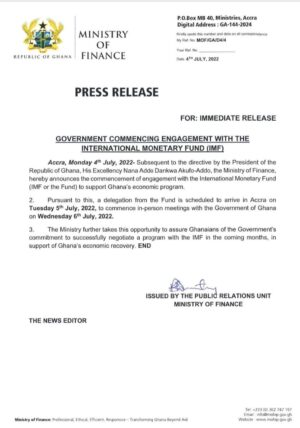The government is expecting a delegation from the International Monetary Fund (IMF), to start in-person meetings following the decision to seek a bailout for the economy.
To this end, the Ministry of Finance, which will engage the delegation, has assured that it will successfully commit to negotiating a programme in the coming months.
This is believed, will help the country in its economic recovery.
The country’s last programme, an Extended Credit Facility with the Bretton Woods institution, ended in April 2, 2019 and so much has changed since then – with debt to GDP projected to end this year at 84.5 percent.
The programme resulted in significant macroeconomic gains with rising growth, but four years down the line, the same issues – fiscal slippages, weakened forex reserves, inflation and exchange rate – that led Ghana to the IMF in 2015 have worsened.
Going back to the IMF is therefore exactly what government needs in order to have an economy wherein expenditure is matched by revenue, Dr. Sam Ankrah, President of Africa Investment Group said.
“I have never been an advocate for the IMF; however, if it will stop government borrowing from central bank, printing money, increasing government payroll, giving tax concessions, exceeding planned and agreed expenditure by more than 5 percent, like what they inherited in 2016 – all they had to do was to keep going with the same fiscal restraint, it will help.
“So, I think it’s good for the economy long-term; let government eat humble-pie and impose the harsh measures. After some years, it will push the economy to sort itself out,” he said.
However, going to the IMF is an option that the government has constantly spoken against in the past, although that stance has softened since the beginning of the year.











